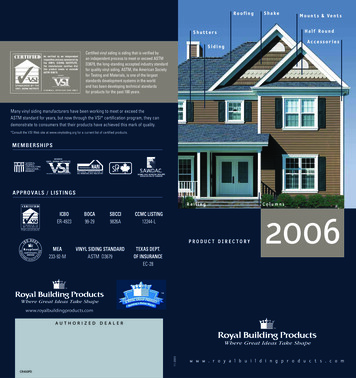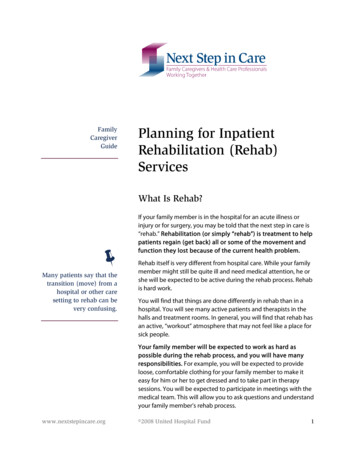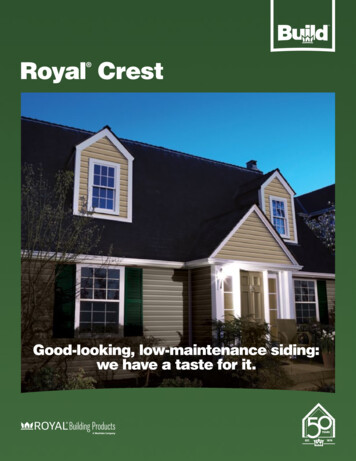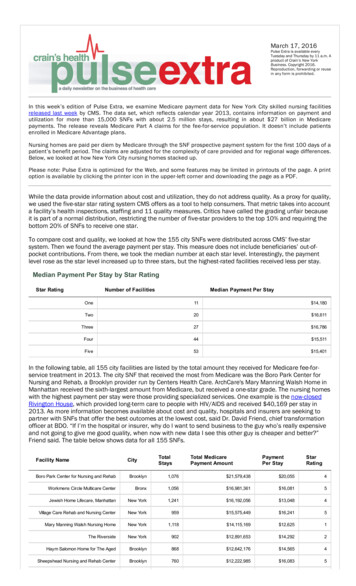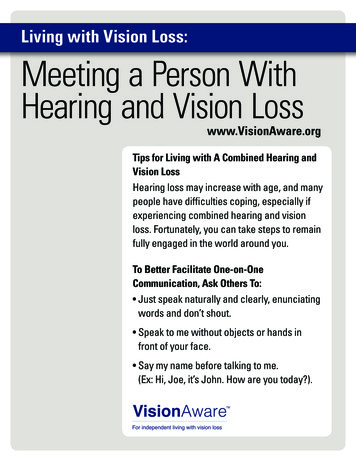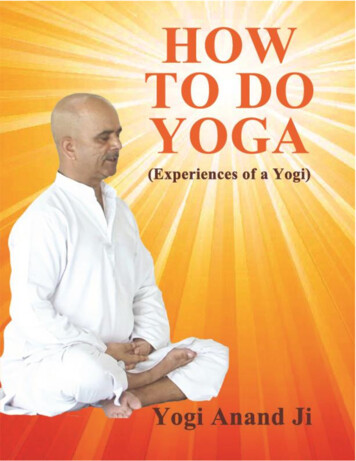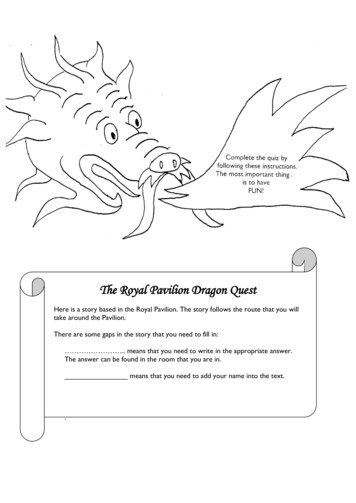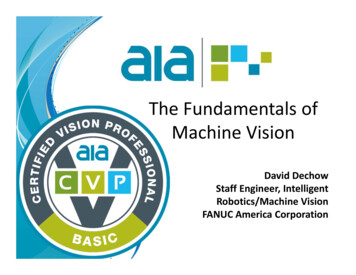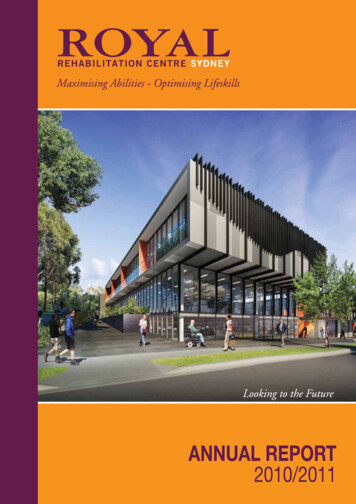
Transcription
Our VisionCelebrating 105 years of ServiceRoyal Rehab’s vision is for people whohave been seriously injured or who haveexperienced a chronic and disabling illnessto regain and maintain their health andwellbeing within the circle of their family,friends and community.Weemala became the “NSW Home for the Incurables”, and servicescommenced on this site in 1906. From these humble beginnings thereare now a vastly expanded range of rehabilitation and disability servicesand facilities.Our MissionTo maximise abilities and optimise lifeskills in partnership with peoplewho suffer a disability as the result of trauma, accident or diseasethrough the delivery of specialist rehabilitation and disability supportservices, based on world class research and evidence based practice.Our ValuesIndependence - We promote independence in a supportive andinnovative environment.Individuality - We respect people’s individuality and promoteunderstanding through open communication.Quality - We value excellence through continuous improvement in thedelivery of our services.Learning and Research - We support the development of our peopleand services, through teamwork, learning and research.PatronHer Excellency Professor Marie Bashir AC, Governor of NSW.Providing Care since 1899Our beginning was due to the energy and compassion of a remarkablewoman of the late nineteenth century, Susan Schardt. Miss Schardtrecognised the needs of patients being discharged from hospital andlabelled as “incurable”, often without family, money, or hope of gettinga job.From these small beginnings in 1899, Miss Schardt’s work becameincreasingly recognised and valued, culminating in a wave of publicsupport that resulted in Sir Henry Moses M.L.C selling his Rydeproperty Weemala.In 1924 Moorong opened for the care of cancer patients, andsubsequently housed the Spinal Injury Unit. Coorabel opened in 1967 toprovide adult rehabilitation services, and the Brain Injury Unit opened in1992. A new Weemala was built in 2011, and construction commencedon the new Rehabilitation Centre for all other services.The Centre’s name has changed over time. From 1906 as the Home forthe Incurables to Royal Ryde Homes in 1954, Royal Ryde RehabilitationHospital in 1978 and finally the Royal Rehabilitation Centre Sydney in1990.Royal Rehab – An IntroductionThe Royal Rehabilitation Centre is a nationally recognised organisationthat provides specialist rehabilitation and disability services for peoplewho have acquired a disability as the result of trauma, accident orillness. Royal Rehab engages in extensive education and research toimprove the rehabilitation outcomes for its clients, and to improve theindependence and quality of life for those requiring long term support.Royal Rehab is a not-for-profit charitable organisation with anindependent Board of Directors. Royal Rehab operates as an affiliatedhealth organisation under the NSW Health Services Act 1997, andas an accredited service with the Department of Human ServicesNSW Ageing, Disability and Home Care (ADHC) and with the NSWLifetime Care and Support Authority (LTCSA). Royal Rehab also relieson financial support from the general community to provide therange of services and equipment required by individuals undergoingrehabilitation, and to support its research activities.As a teaching hospital, Royal Rehab has partnerships with theUniversity of Sydney’s academic units, including the RehabilitationStudies Unit, the Centre for Community Based Health Care, and theCentre for Disability Studies, in addition to our own RehabilitationNursing Research and Development Unit and the Royal RehabilitationCollege.Royal Rehab provides on-site and home based rehabilitation for thosewith complex and long term health care needs, traumatic brain injuryand spinal cord injury, and supports the development of specialistspinal cord rehabilitation services in regional NSW. Royal Rehab alsoprovides a growing number of long term supported accommodationplaces for people with significant disabilities living in the community.
Chairman’s ReportI am pleased to report that 2010-11 was a most satisfactory year in terms of the advancements made towards achievement ofthe Board’s vision to create a Centre of Excellence in rehabilitation medicine and disability support at our property at Putney. Ournew Weemala facility was recently opened by the NSW Minister for Health, Jillian Skinner MP. This building is a vast improvementon the old Weemala in every aspect, and provides a wonderful home-like environment for our long term residents with complexhealth care and support needs. Most importantly, whilst options for relocation to Royal North Shore Hospital were investigated with the Northern SydneyLocal District Health, NSW Health has recognised and accepted the sensibility of collocation of our new state of the art Rehabilitation Centre to helpprovide on-going support to our Weemala residents, and to meet our commitments to the local community through the construction of much neededcommunity facilities. Construction on our new Rehab Centre is scheduled to commence in November of this year.2010-11 was also a year in which Royal Rehab was able to significantly improve its financial operating performance in what remains a very tight fundingregime. Whilst there still needs to be proper recognition by NSW Health of the higher cost of specialist rehabilitation services, Royal Rehab managed tocontain its operational costs to significantly reduce its operating losses. Steady growth was again achieved in the organisation’s Community Servicesportfolio where Royal Rehab provides both home based rehabilitation services and full time care in Supported Accommodation homes throughout theSydney region for people with a disability and high support needs.With the issues of the redevelopment now largely behind us and the major construction underway, I am looking forward to the year ahead to continue ourexpansion into community based services, and to invest more focus and energy into the growth and support of our research and educational activitieswhich form such an integral part of our service delivery at Royal Rehab.I would again like to acknowledge the tremendous passion and commitment, and the achievements of all of our staff and Management without whomRoyal Rehab could not achieve the wonderful outcomes for each of our clients. I would also like to express my gratitude for the counsel, commitmentand vision of my fellow Directors who give voluntarily, so much of their time and energy to this great organisation. In particular I would like to thank BruceHatchman and John Dakin who are retiring from the Board after many years of exceptional service.Clive N AustinChairmanChief Executive Officer’s Report2010/11 was a major milestone for Royal Rehab with the completion recently of our new Weemala long term care facility. This32 unit facility provides for the changing health care and support needs of our existing residents in a modern, well appointedhome-like complex supported by on site staff and as required, staff from the adjacent Rehabilitation Centre. The facility will overthe longer term provide transitional accommodation for complex clients who no longer require full inpatient treatment, but areawaiting home modifications or the organisation of community based support in their local area. Our long standing Weemalaresidents have settled extremely well into their new homes, and visits by the NSW Treasurer Mike Baird, the Minister for Disability Services AndrewConstance and the Minister for Health, Jillian Skinner who officially opened Weemala, as well as a number of Senior Executives from the Department ofAgeing, Disability and Home Care and the Lifetime Care & Support Authority have given us a great deal of confidence that facilities and programs suchas this are most highly regarded and in short supply.Weemala is only the first Stage of a comprehensive redevelopment plan for Royal Rehab’s Putney site. Royal Rehab is now well and truly “looking tothe future” and is proceeding with Stage 2 of its redevelopment – the construction of a new 60 bed state of the art rehabilitation centre, together witha community hall and child care centre, and associated recreational landscaping and facilities for joint use by the local community and our own clients.An application for a 24 bed Private Hospital Unit together with a Day Hospital program has been submitted to NSW Health, to replace the beds whichwill be lost to the Graythwaite Unit in early 2013. These private beds will focus on complex stroke, post-surgical reconditioning and orthopaedics.ADCO Constructions, who have done such a great job on the new Weemala, have been awarded the construction contract and will commence work inNovember 2011. The Centre is expected to be completed by the last quarter of 2013.Planning for the redevelopment and the consequential relocation of all operational units, service teams and tenants has of necessity been aconsiderable focus of the year just gone. In the restricted space available to us, Youthsafe, the Dixson Day Activity Centre, and the Centre for DisabilityStudies have relocated to other premises but I would like to acknowledge the valuable relationships with each of these entities that we have enjoyedover many years. Wheelchair Sports NSW, Stroke Recovery NSW and Brain Injury Australia remain with us and we are most pleased to be able toprovide accommodation and support for them throughout this phase of our redevelopment.2010/11 has also seen a steady expansion of our Home and Community Based Rehabilitation and Disability Support services. The pilot Neurobehavioural service which was a joint venture with the UK based Brain Injury Rehabilitation Trust did not proceed but Royal Rehab continues toprovide care and support to a number of clients who progressed through that service and who are now living in the community, in our supportedaccommodation.Finally, I would like to pay tribute to the unrelenting professionalism and passion of all of the staff at Royal Rehab and acknowledge the tremendoussupport and resolve of my Board, for a most satisfactory year in this important transition.Stephen LowndesChief Executive OfficerAnnual Report 2010/20111
NSW Minister for Health Jillian Skinner with official guests Stephen Lowndes CEO, RydeCity Clr Vic Tagg, Residents and Advocates Chairman Mick Matthews, Chairman Cive Austin,Victor Dominello MP, Vice Chairman Anthony Staveley, Stan Riley descendant of Royal Rehabfounder Susan Schardt and Weemala residents Warren Allen and Margaret MacKenzie.Stan Riley, the great nephew of the founder Susan Schardt speaking at the openingof Weemala, said “If my great aunty Susan were here today she’d throw up her armsand rejoice in the Lord to see such a beautiful place.”Spacious accommodation areas for residents provide individual privacy andindependence.2
The Year in Review2010/11 finally saw the commencement of Royal Rehab’s long-heldredevelopment plans with the construction of our new Weemalafacility, completed in September 2011 and recently Opened by theNSW Minister for Health, Jillian Skinner. Weemala is the name ofthe original building purchased by our Founder Susan Schardt, withthe assistance of a public fund-raising campaign so it is most fittingthat that this facility, which provides a home for 32 of our longestpermanent residents, celebrates over 105 years of continuous serviceto the citizens of NSW with a disability and continues to deliver uponher vision all those years ago. Mr Ron Cowland has resided and beencared for at Royal Rehab for over 50 years, and it was most fitting thatRon turned the first sod on his spacious, modern and magnificentlyappointed new home, in September 2010.Weemala is only Stage 1 of what is a major project to deliver a stateof the art rehabilitation facility to the people of the Northern Sydneyand Ryde area and for New South Wales. Construction work on thenew community parkland, is nearing completion. This land has beendonated to Council and the people of the Ryde community by the RoyalRehabilitation Centre as part of the overall development approval.Stage 2 will comprise the 60 bed Rehabilitation Centre, CommunityHall and Child Care Centre and the Recreation Circle, complete withhard surface sports courts. Construction is scheduled to commence inNovember 2011 with all works completed by November 2013.It has been an extremely busy twelve months with the planning andrelocation of all inpatient services, commencing with the closure of theold Moorong building and relocation of our Spinal Injury Unit in Februarythis year to the existing Weemala complex. The successive relocationof each of our other clinical units to the old Weemala and Hodsonbuildings has tested the resolve and good will of all of our staff andpatients at some stage but they have all responded magnificently aswe “look to the future”, to ensure that the high standards of care andclinical governance have been maintained throughout.Funding pressures were again a feature of the year in review, requiringtight cost management and constraints on professional developmentactivities and equipment upgrades. However, thanks to the generosityof our Foundation Members Brydens Lawyers and ISS CleaningServices and some wonderful fund raising initiatives from a number ofour patients and their relatives, several initiatives were made possible.Our annual Foundation Dinner raised some much needed funds to helpmeet the costs of our Driver Assessment and Training program, andto develop new programs in our Spinal Injury Unit; the Run for Scottteam in the City to Surf and Brianna Shaw’s brave trek along the lengthof the Great North Walk to raise money for smart technology devicesfor our Brain Injury Unit, and Anthony Abraham’s kayak trip down theMurray River to raise money for our Spinal Injury Unit were but a fewexamples of the wonderful support for Royal Rehab received from manyof our clients and sponsors. ADCO, our construction partners for thenew Rehab Centre sponsored our Annual Golf Day, and once again theDucati Owners Club continued their wonderful support of our SpinalInjury Unit.The support of our State and Federal politicians has again beenmost appreciated, with visits throughout the year from our local NSWMember for Ryde, Victor Dominello, Federal Member for BennelongJohn Alexander, State Treasurer Mike Baird, Andrew Constance theMinister for Ageing & Disability, and of course Jillian Skinner theMinister for Health.2010/11 saw the introduction by the Royal Rehabilitation College ofnew Certificate and Diploma courses in Disability, and in Rehabilitationcontinuing its excellent record of building capacity and competence inthe rehabilitation and disability support sector.The year culminated with Royal Rehab’s Return2Sport Expo heldat Sydney Olympic Park in conjunction with the Sydney ParalympicCommittee where over 45 disability sporting and recreationassociations were represented, providing opportunity for manyhundreds of visitors to come and try one of the many sports on display.The Expo was opened by the NSW Minister for Sport Graham AnnesleyMP and we look forward with his Department’s continued support, toextending this tremendous concept to other major Centres next year.Andrew Constance MP Minister for Disability Services made an extensive tour of Royal Rehab, including visits to the new Weemala and the Brain InjuryUnit. Photo: Dr Stuart Brown, Delia Gray, Rachel Merton (CEO Brain Injury Association of NSW), Dr Clayton King, Tish Peiris (client advocate), AndrewConstance MP, Stephen Lowndes, Don Ferguson ( Regional Director Metro North, ADHC)Annual Report 2010/20113
The Royal Rehabilitation FoundationThe Royal Rehabilitation Foundation was established with a primaryaim of attracting corporate and individual support for the RoyalRehabilitation Centre, to engage in research projects.The identification, evaluation and implementation of evidence basedpractice is a fundamental philosophy of Royal Rehab, to ensure the bestpossible outcomes for our clients.The Royal Rehabilitation Foundation also assists in the purchase andassessment of leading edge equipment and assistive technologyapplications to improve the quality of life and independence of peoplewith a disability.The Chairman of the Royal Rehabilitation Foundation is Board Director,David Piper OAM.Foundation MembershipConstruction Industry PartnershipSupported by the Foundation, the Construction Industry Partnershipwas formed to identify safety related issues that will be the subjectof new research initiatives, for the development and implementationof new work place safety practises. The aim is to create a saferconstruction workplace across Australia, reducing the incident ofpreventable workplace injury.ResearchThe Royal Rehabilitation Foundation provides support for the ongoingeducation and development and support for staff undertaking researchthat is related to their area of practice at Royal Rehab.The Royal Rehab Human Research Ethics Committee is responsiblefor providing ethical review and monitoring for the ongoing conduct ofresearch.Brydens Compensation Lawyers are committed to supportingrehabilitation projects that assist people who have suffered stroke,brain injury, burns, and spinal injury. Brydens, one of the largest lawfirms in Australia, work with compensation and personal injury clients.ISS Facilities Services support the Working Together programs whichoffer individually tailored multidisciplinary rehabilitation, designed tomaximise function and independence.Using the Lightwriter, a client is able to “speak” the name of his friendsidentified from the photos.The Lightwriter was donated by the James N Kirby Foundation, andis used by Speech Pathologists in a rehabilitation program improvingcommunication, memory, and speech to those recovering fromtraumatic brain injury.The Recreational Fishing Trust working with Royal Rehab’s RecreationalTherapists, provides opportunities for regular fishing trips for residentsand clients. Funding supplies modified rods and equipment, adapted foruse in this recreational program.Team Scott approach the finish line of the City2Surf led by ScottMcLean. Scott had set a goal in his rehabilitation program to completethe race and challenged his friends to go the distance with him. Morethan sixty team members, including the Royal Rehab Runners andWalkers completed the 14km challenge with Scott and his partnerRaelene.4
EventsDonationsFoundation Dinner: The annual Royal Rehabilitation Foundationdinner was held at Con Dedes’ magnificent new Woolwich waterfrontrestaurant, The Deckhouse.Royal Rehab was able to upgrade equipment and supply newtechnology for many of its services including spinal and brain injury,stroke, burns, aged related illnesses and home based services. RoyalRehab’s Community Homes have attracted significant support fordelivering services within local areas that directly benefit the residentsand clients.Guests were inspired and challenged with speeches and presentationsmade on behalf of a spinal injury project that will honour the life ofNick Morozoff. Generous support also came for the Driving AssessmentProgram following a testimonial from Daniel Buzuola, and Channel 10reporter, Angela Bishop revived memories of the visit of Princess Di toRoyal Rehab in 1996. A capacity attendance responded with donationsand pledges following these heart-warming experiences shared byclients who had benefited from the expertise of Royal Rehab’s staff andservices.Charity Challenge Golf Day: Long Reef Golf Club hosted the inauguralADCO Cup to benefit the Royal Rehab Foundation. A full field of 120players enjoyed beautiful conditions for golf. At the lunch that followed,the special guest speaker was Scott McLean. Scott is a professionalstuntman, who had suffered severe injuries following an incidentwhile making the film, Hangover Part 2. Scott and his partner, RaeleneChapman were an inspiring example of courage and determinationto overcome the obstacles that they now faced. Scott had spent 10months in Royal Rehab’s Brain Injury Unit.Everyday HeroesThree significant activities were promoted through the Everyday Herowebsite to raise funds for specific services at Royal Rehab.Paddle For Pop: Anthony Abrahams paddled a kayak 200km down theMurray River to attract sponsorship support for his challenge. “Paddlefor Pop” was dedicated to his father Tony Abrahams, who was in theSpinal Injury Unit. Money raised will provide new equipment for theSpinal Rehab gym.Doing it for Dad: Brianna Shaw’s dad, Steve, has been recoveringat Royal Rehab after a head injury he suffered in a cycle accident.Brianna’s challenge was to complete the Great North Walk, a 238kmwalk to raise awareness and funding for new technology within theBrain Injury Unit.Run For Scott: Scott Mclean challenged his friends to compete inthe annual City to Surf to raise funds for the Brain Injury Unit at RoyalRehab. Scott’s promise to them was that he would do the distanceand cross the line with them! “Run for Scott” raised over 45,000 indonations.Thanks to:Inghams Chickens; Cecilia Kilkeary Foundation; R T Hall Estate; JamesN Kirby Foundation; Australian Chinese Foundation; Five Dock Rotary;The Primary Club; Department of Fisheries; Coopers Brewery; ICAP;Ducati Owners Club of NSW.A unique event created in the Sydney office of wholesale stock brokingfirm, IPAC, raised 50,000 for Royal Rehab. IPAC internationallydonated a percentage of their total day’s trading to several nominatedcharities, including Royal Rehab.The Cecilia Kilkeary Foundation, support the Driving Assessment andRehabilitation Centre, providing opportunities for people with significantdisabilities to regain their independence and return to driving.The R T Hall Estate are currently funding a research project for cardiovascular lipid disease.Ten metropolitan Councils supported Royal Rehab through their annualCommunity Development Expenditure Scheme (CDSE) assisting boththe Driving Assessment Service and Community Home projects. Councilareas included: Ryde; Fairfield; Ashfield; Canada Bay; Holroyd; NorthSydney; Parramatta; Baulkham Hills; Warringah; Canterbury.Acknowledgments:David Gyngell (CEO Channel Nine);Peter V Landys (CEO Racing NSW);Bruce Tyrrell (Tyrrells Wines); Daryl Kelly (CEO ANZ Stadium); DavidGallop (CEO, NRL); David Gilbert (CEO Cricket NSW); Star Casino; PanMacmillan; Concord Golf Club; Gladesville Healthcare; Con Dedes;Radio 2GB - Alan Jones, Ray Hadley and Chris Smith; Peter Fitzsimons(author); Reg Cain - Betta Electricals; Val Gibson; Dr Niel Boustred;Wandin Valley; Tatler’s Wines; Ryde Freighters; Slater and Gordon;Stacks Goudkamp; Beilby, Poulden & Costello; The Epping Club; RobPotts (Entertainment Edge); Ed Riley (Max Sam); Commonwealth Bank;Arrow Voice & Data; Northern District Times; The Weekly Times.Right: Darren Ashford and his son Harley with Craig and Wendy Jobfrom the Ducati Owners Club and David Paix check over the classy redItalian Ducati ST3S prior to the annual Ducati Day. Ducati Day 2011was a celebration of 30 years of sponsorship support for the SpinalInjury Unit by the Ducati Owners Club NSW.Annual Report 2010/20115
The Rehabilitation DirectorateThe Rehabilitation Directorate provides a range of inpatient, outpatient,and community based and outreach services for clients who haverecently had an injury or illness and require rehabilitation. Ourrehabilitation services offer individually tailored, multidisciplinaryprograms designed to maximise function; and assist our clients inadjusting to their disability and attaining as much independence aspossible. Rehabilitation bed days increased on prior year as did therevenue from privately insured and compensable clients.Spinal Injuries Unit and Spinal Outreach ServiceThe state wide Spinal Injuries Service provides inpatient rehabilitationin a 20 bed Spinal Injury Unit; and post discharge, community basedclinical support through our Spinal Outreach Service for clients whohave suffered traumatic or non traumatic spinal cord injury.The Spinal Outreach Service focuses on effective education for bothclients and clinicians, living and working in metropolitan Sydney andrural areas of NSW, helping spinal cord injury clients maintain theirhealth and participation in their local community.Brain Injury Unit and Brain Injury CommunityRehabilitation TeamOutpatient DepartmentThe Outpatient Department provides a range of goal directed individualand group therapy programs for clients who have experienced a declinein function. The aim is to enhance the quality of life enjoyed by all ourclients.The service provides clients with the option to remain living in their ownhome and visit the Centre as often as they require therapy. Throughthis service clients access medical care and skilled multiple alliedhealth services in one team, comprehensive assessment and treatmentfacilities, and regular updates to their GP on progressDriving Assessment and Rehabilitation CentreThe Driving Assessment and Rehabilitation Centre is designed forclients who have had their driving ability compromised by a medicalcondition, and provides access to our highly skilled staff, in thisvery specialised area. Occupational Therapists have all completedpostgraduate studies in driver assessment and are registered withthe Roads and Traffic Authority. The Service offers heavy vehicle andscooter assessments and advice on modifications for clients wishing tolearn to drive. Assessments are conducted in Ryde and Mona Vale andwhere restricted licenses apply, service is provided in the client’s homeenvironment.The state wide Brain Injury Service provides inpatient rehabilitation andcommunity based transitional support for clients from across NorthernNSW who have sustained a traumatic head injury. The rehabilitationprograms address the individual needs depending on the type of injuryand part of the brain affected. Prevalent causal factors are assaults,motor vehicle accidents, sporting accidents and falls.The Brain Injury Community Rehabilitation Team provides casemanagement services and assistance addressing health issues,relationships, learning, finance, work and leisure following dischargefrom inpatient rehabilitation.Adult Rehabilitation ServiceThe Adult (CARS) and Aged Care (Dixson) Rehabilitation programsprovide rehabilitation for clients following stroke, burns, neurologicaldisease, amputation, and orthopaedic injury. The Adult Rehabilitationprogram is designed for clients of working age, whilst Dixson clientsare over the age of 65 and are part of the Ryde Aged Care Service. Amajor focus of 2010/11 was on developing neurological and strokerehabilitation programs to ensure best practice in the delivery of thoseprograms.Mobility Equipment and Seating ServiceThe Mobility Equipment and Seating Service provides: hire,maintenance and seating service both internally to our inpatientclients and to external customers. Our maintenance service providesboth routine services and emergency repairs for all types of mobilityequipment and links clients back into our therapy services when newprescriptions are required. The hire service has expanded with theinclusion of a variety of highly specialised mobility and recreation itemssuch as standing wheelchairs, beach wheelchairs, hand cycles and themodified SoloRider golf cart.6
Home Based Rehabilitation ServiceContinuing and New ClientsThe Home Based Rehabilitation Service provides an intensive goalbased rehabilitation program (up to 6 weeks) for clients in their ownhome or community environment. Specialist nursing and allied healthstaff work with the client to regain or improve independence in a rangeof activities related to daily living. The clients may have suffered arecent injury or illness or a chronic musculoskeletal or neurologicalcondition. The multidisciplinary team have significantly increased thenumber of hours of service delivered, and the occasions of servicedelivered. Referral to this program can be made by members of atreating team. Treatment and care is covered by Medicare. RoyalRehab’s contract with NSCCAHS to provide the allied health therapycomponent of their transitional aged care program has contributed tothe expansion of the Home Based Rehabilitation Service.The Community Services Directorate supports more than 110 longterm clients in accommodation. These clients continue to receivesupport, rehabilitation, training, and, where needed, nursing andmedical support. During the year support was extended to include newclients. It is anticipated that Community Services will be providingsupport and rehabilitation to these clients over the long term.Service AchievementsThe review of the research on effective rehabilitation and servicedelivery has led to an increased focus on improving the coordination ofservices in clients’ home environments. The aim of this coordinationis to increase the inter-relationship between therapies and the supportthat clients receive while they carry out activities in their homes and inthe community.The Community Services DirectorateThe Community Services Directorate provides supportedaccommodation and rehabilitation. The service works with adults whohave experienced acquired brain injury or spinal cord injury, and withclients with developmental disability. Most clients also have complexcare, challenging behaviour, or mental health issues.During 2010-11 clients achieved significant milestones, as a result ofcontinuing to develop strategies and tools to keep up with the latestresearch in rehabilitation and to build this knowledge into practice.Our ClientsTransition Unit ClientsSenior Client Support OfficersSenior Client Support Officers - coordinate support and rehabilitation inclients’ homes and are part of the team delivering care.Independent Living CoordinatorIndependent Living Coordinator - works with clients in our TransitionUnit and with clients from the Lifetime Care and Support A
the Incurables to Royal Ryde Homes in 1954, Royal Ryde Rehabilitation Hospital in 1978 and finally the Royal Rehabilitation Centre Sydney in 1990. Royal Rehab – An Introduction The Royal Rehabilitation Centre is a nationally recognised organisation that provides spe
